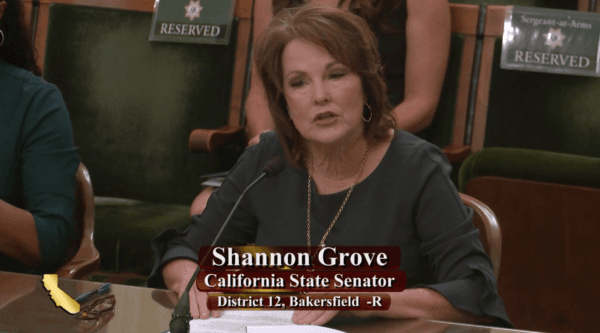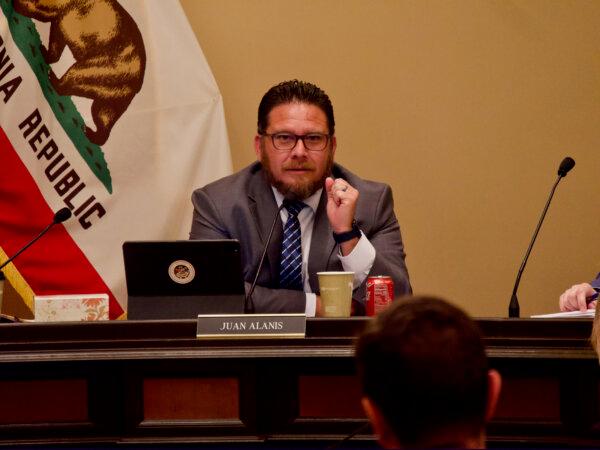A proposal to strengthen penalties for those caught soliciting a child for sex in California was amended by force during a contentious hearing of the state Senate’s Public Safety Committee on April 16.
At issue is Senate Bill 1414, authored by state Sen. Shannon Grove and co-authored by a bipartisan cohort, which seeks to make such a felony punishable by up to four years in prison with fines as high as $25,000.
Under existing law, such crimes are misdemeanors carrying a minimum of two days in jail and fines up to $10,000.
As originally written, the bill would mandate anyone purchasing a child for sex would be liable whether they claimed to know the child was underage or not. It would have also ordered those convicted to register as sex offenders for 10 years.
The amendments—approved 4–0 by the committee and deemed “hostile” by the author—included making penalties only applicable to adult perpetrators and removing a clause that would impose strict liabilities on offenders regardless of whether they know their victims are underage.
Also changed was that for victims 16 or older, a solicitors’ first offense can be charged either as a felony or misdemeanor, while subsequent offenses are punishable by county jail instead of prison.
Finally, another amendment was that sex offender registrations would apply only to repeat offenders with at least a 10-year age difference from their victim.
“I’m incredibly disappointed that not only did my colleagues reject my proposal to make the buying of children for sex a prison felony, but that I was blindsided when they amended my bill without my consent,” Ms. Grove said in an April 16 statement.
The author agreed to the amendment for first-time offenders not being placed on the registry but rejected the age difference clause and staunchly contested the other forced amendments, saying the process was watering down the bill.
“I am not willing to amend the language so that the bill only covers those 15 and under,” Ms. Grove said. “I’m not willing to look these victims in the face and tell them their stories don’t matter.”
Opponents argued in legislative analyses that California is one of 10 states with an age of consent of 18 and suggested that some minors use child prostitution as a means of survival.
“It is misguided to require individuals to register for 10 years on the sex offender registry when they are engaging in an activity that would be legal in 80 [percent] of the country,” the California Public Defenders Association wrote the committee in opposition. “This change will unfortunately lump some defendants into the category of ‘sex offender’ with lifelong consequences for them and their families even though the intent is completely lacking.”
The author dismissed such claims as an excuse to avoid responsibility and urged lawmakers to strengthen penalties and support the bill without the amendments.
“Buying a child for sex at any age should be treated as a serious crime that it is,” Ms. Grove said. “Implying that older teens can consent to sex is just a copout; it’s your way of saying that we shouldn’t be responsible for caring and protecting them.”

State Sen. Shannon Grove, a Republican, speaks during a committee hearing in Sacramento on July 11, 2023. (California State Assembly/Screenshot via The Epoch Times)
She said the victims are retraumatized by such language and are effectively blamed for their victimization.
“By framing the situation as consensual, it shifts the blame to the victim, which also allows perpetrators to avoid responsibility,” Ms. Grove said.
Noting the supply and demand element of the exploitation of children, she said buyers and sellers must be held accountable for their actions to stop the trade.
“In order to sell a child for sex, there must be someone willing to purchase that child for sex,” Ms. Grove said during opening remarks. “That’s why we’re here today to address the purchasers and put a stop to those who would pay to have sex with children.”
Several survivors spoke out in support of the measure before the amendments were added, and one former victim of child sex trafficking said she was lured and tricked into child prostitution at the age of 14 and subsequently found herself trapped and threatened by her traffickers.
“At no point or at any age did I choose to be there,” Sandy Esparza said during the hearing. “I had nowhere to go, I was terrified, and I needed help that never came.”
The lone Republican on the safety committee supported the measure as originally intended and said the crime of trafficking children for sex will continue to proliferate unless more is done.
“It should be illegal, and it gets more atrocious as these ... sex offenders prey on these young kids,” state Sen. Kelly Seyarto said during the hearing. “Until we make serious consequences for that, it’s going to continue, and it’s going to get worse.”
One Democratic committee member expressed his support for the original bill while acknowledging the concerns of his colleagues.
“I’ve generally been concerned about enhancing penalties and creating new felonies, especially about their consequences on communities of color,” state Sen. Steven Bradford said during the hearing. “However, I believe a higher penalty, one that involves exploitation of vulnerable children, is appropriate.”
Other Democratic committee members noted their opposition to the bill’s original language and wariness to agree to the amended version.
“The issue I have with the way the bill is constructed now is ... that it goes too far,” state Sen. Nancy Skinner said. “For some of us, even what the committee is offering goes way beyond the comfort zone.”
Another said opposing members of the panel could have rejected the proposal outright but are looking to reach a compromise.
“This bill is incredibly overbroad, in my opinion, and we could have just said no, but we in good faith, on both sides, have tried to work through this,” state Sen. Scott Wiener said during the hearing. “This bill goes well beyond human trafficking ... and will sweep in people who are not trafficking ... and will send people to state prison and put people on the sex offender registry which is effectively the end of their life.”
One lawmaker supporting the bill, with decades of law enforcement experience, said his experience observing the traumatic experiences suffered by victims led him to the conclusion that the bill as originally written is vitally important to protecting children and expressed his frustration with the forced amendments.
“The selling and purchasing of children for sex should be a felony here in California,” Assemblyman Juan Alanis said in a statement emailed to The Epoch Times. “The amendments forced on Senator Grove ... in the Senate Public Safety Committee are difficult to reconcile against common sense and decency.”

California state Assemblyman Juan Alanis, vice-chair of the Public Safety Committee, questions witnesses during a hearing in Sacramento on April 9, 2024. (Travis Gillmore/The Epoch Times)
Asked about the matter at an April 18 press conference covering a different topic, California Gov. Gavin Newsom said he is monitoring the situation and potentially played a role in its progress thus far.
“I wouldn’t say we weren’t involved in at least getting it out of committee,” Mr. Newsom said.
The governor and Assembly Speaker Robert Rivas intervened last year to help another bill related to trafficking children ultimately become law, Senate Bill 14—also authored by Ms. Grove—after it was initially dismissed by the Assembly Public Safety Committee.
Recognizing the complexity of the issue, he noted his intention to find common ground and ultimately sign a modified version of the new bill later this year.
“I look forward to getting this bill to my desk in a way that I’ll sign it,” Mr. Newsom said. “We have some work to do, but I deeply appreciate the direction that Senator Grove is going, and I’m mindful that those three amendments, one in particular, that there’s some work to do.”
Following the amended bill’s passage, Ms. Grove said she is contemplating the next steps with co-authors and stakeholders and will continue to see the language adapted in the coming weeks.














